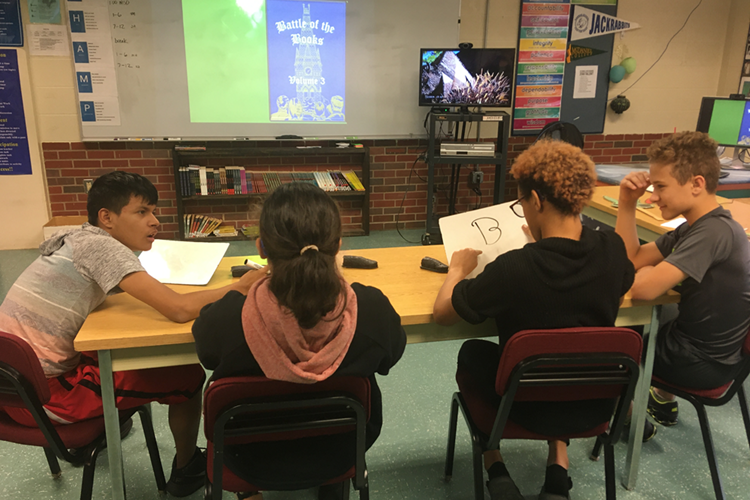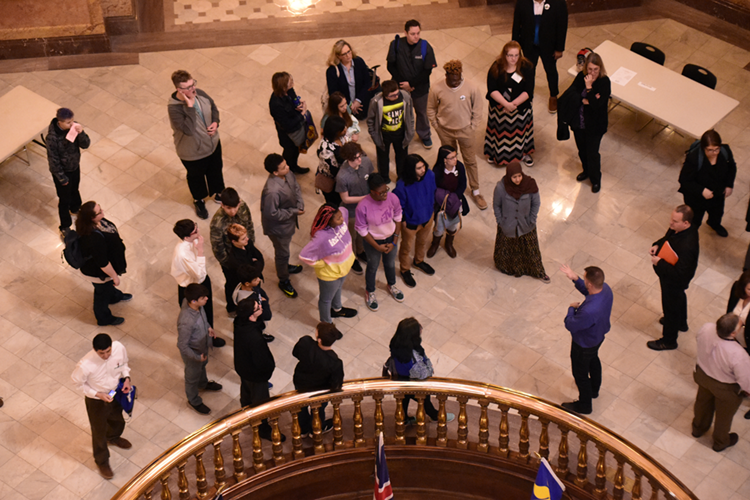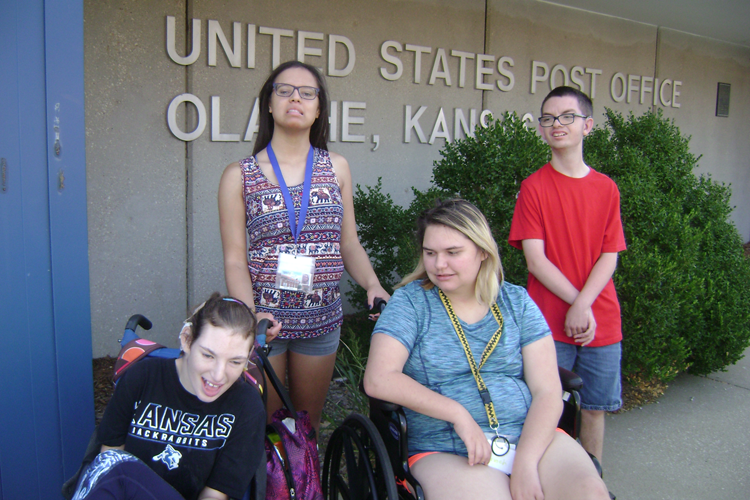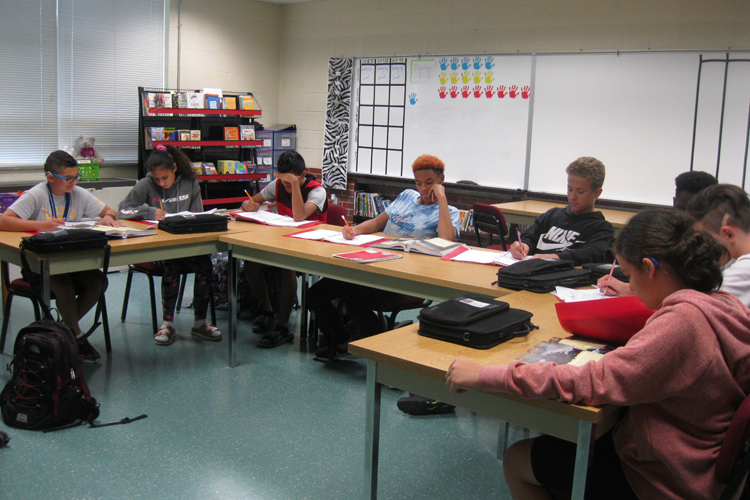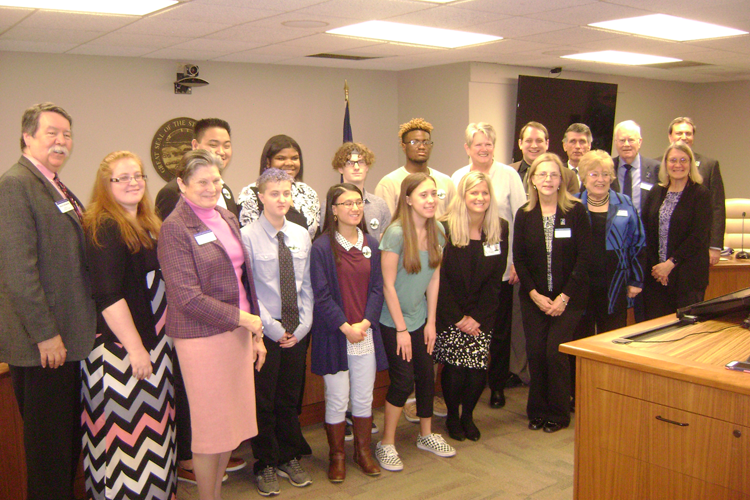Secondary
Kansas School for the Deaf Secondary program consists of grades 7 - 12. KSD's core curriculum follows Kansas State Standards. Students receiving the Kansas Board of Education diplomas must complete the minimum graduation requirements of 25 credits. Textbooks have been adopted following these state standards as well as the use of differentiated instructional practices and modifications to meet the needs of our students. We offer a bilingual (American Sign Language and English) approach to teaching; a visual, hands-on approach to education; classrooms full of active learning; and both large and small group settings for instruction. KSD high school classrooms are exciting places to learn and prepare for life.
Our Vision and Beliefs
- Each student has the right to a safe environment
- The curriculum builds and reinforces students' strengths
- The students have similar school experiences as their peers, regardless of disabilities
- The students develop the life skills for success in a variety of learning environments
- The students be given the opportunities to succeed in post-secondary education/training and employment
- Family, school, and community form a partnership to work as a collaborative team to meet the individual needs of each student
Seventh and Eighth grade students take a prescribed course of study which includes English/Writing, Math, Science, Social Studies (US History, Kansas History, and World Geography), and Physical Education. In addition, all students receive a set of electives. Elective courses include: American Sign Language Immersion and Tutoring, Career Explorations, Home Improvement, Introduction to Technology, Introduction to Driver's Education and Visual Arts. Students begin attending their IEP meetings in seventh grade. A Personal Plan of Study is developed for each student.
High School consists of grades 9 through 12 . Students receiving the Kansas Board of Education diplomas must complete the minimum graduation requirements of 25 credits. All high school students consult with the Transition Coordinator and Primary Provider each school year regarding selection of course offerings to meet the requirements for graduation as well as their post-secondary plans.
The focus of the high school program includes post-secondary planning including but not limited to preparation for employment, advanced education and/or training, volunteerism, and independent living skills. An Individual Plan of Study is developed for each student.
Curriculum
English Language Arts: Students are required to have a language arts course each semester in high school of where the focus is on need-based skills as well as general statewide core curriculum.
Mathematics: The mathematics progression is General Math, Pre-Algebra, Algebra, Geometry, Algebra II, College Algebra, Pre-Calculus and Personal Finance. Life-skills math is offered as well.
Science: Science courses taught are: Biology, Physical Science, Earth/Space Systems, Environmental Science, and Horticultural. Lab experiences and an elective class, "Introduction to Technology/Digital Technology" utilizing Robotics, enhances student learning.
Social Studies: Social Studies content classes include US History, World Geography, Modern World History and Government. Electives in the social studies area include Current Events and World Issues.
American Sign Language/Deaf Studies: All students are required to take ASL/Deaf Studies to establish a better sense of their cultural history and to understand current issues within the Deaf community.
Life-Centered Education: This program learning offers life-skills based opportunities for students needing higher levels of real life applications following the Kansas Common Core Essential Standards. Students also have the opportunity to participate in Job Olympics, supported work experience, and hands-on learning.
Academic Options: Students have the option of Dual Placement classes with Olathe Public Schools or one's home school district(if distance allows). Olathe Advanced Technical Center offers a 2-year training program in the following areas: Automotive Collision Technology, Automotive Technology, Construction Trades and Welding Technology. Transition into Post Secondary, (TIPS) is offered in collaboration with Johnson County Community College.
Career:
Career Exploration: Seventh and eighth grade students take classes to explore career interests and self-awareness skills for future job choices. Ninth and tenth grade students are required to take Career Training for soft skill and work skill development. Eleventh and twelve grade students experience on and off campus internships, job shadows, and supported employment.
Course Selection Book
- Course of Study
- High School Classification Guidelines
- Graduation Requirements
- Community Service Hours
- Curriculum and Assessment
- Career Technical Education
- Individual Plan of Study
- Testing Information
Please refer to the following link for an in-depth look of our course offerings at Kansas State School for the Deaf:
KSD Course Book 2022-23
Community Service Hours
Community Service Brochure
Academic Support
Academic advisers assist students with their coursework to ensure they are meeting graduation requirements, while a Career Development and Transition Coordinator assists students with post-secondary education or vocational choices after high school. To learn more about the Transition Program; KSTAR, visit the Transition Program Link under Academics. This program includes assistance with college admissions, financial aid, scholarships, and testing.
Dual Placement
Our Dual Placement program is a partnership between Olathe Public Schools and KSD. Our students have the opportunity to take a variety of classes to pursue their future career choices: core, electives, and Career Technical Education classes. KSD provides transportation to and from the participating school. Interpreter is also provided to facilitate communication. For more information click on Dual Placement.
American Sign Language/English Bilingual Language Arts
Our ASL/English bilingual program provides content instruction for Deaf and Hard-of-Hearing students using both social and academic ASL and English to promote higher levels of language, literacy development and critical thinking skills. Academic work is kept at grade level in both languages at all times. Using language separation, the ASL Language Arts instruction and the English Language Arts instruction are linked together across the curriculum; students receive opportunities for language experience in signing, viewing, reading, and writing in both languages. Students who have access to spoken English also have opportunities for language experience in listening and speaking across the curriculum.
Students who have emerging, limited ASL skills participate, on a short-term basis, are enrolled in an ASL Immersion class every day for one hour to focus on development of social and academic ASL in support of overall bilingual acquisition. Driven by Kendall conversational Proficiency Level (P-Level) assessment findings, students work on their ASL conversational skills, and their ASL conversational skills are assessed each quarter. Students, achieving a P-Level score of 4, are dismissed from ASL Immersion class and begin receiving individualized ASL services. Students who are new to ASL may also receive services from a Language Facilitator on a short-term basis to assist with the comprehension of academic ASL use in content-area classes.
ASL and Spoken English Services
The Speech-Language Department provides ASL and spoken English support and assessment based services. Deaf and Hard-of-Hearing Students may be seen in small groups, in individualized sessions and/or through consultation. In speech and/or language, students work on goals specific to their needs through theme-based small group and/or one-on-one instruction. Students are encouraged to work on articulation, auditory learning, clarification strategies, communication strategies, fluency, language, semantics, speechreading, and vocabulary.
Support Services
Students having specific language, socioemotional and/or physical needs based on their Individual Education Plan (IEP), are entitled to receive support services. To address their language needs, they may receive one or more of the following: ASL tutoring, speech-language therapy, ASL immersion, and/or reading intervention. Counseling services are provided to students for their socioemotional needs in addition to counselors and teachers teaching students social skills. Students' physical needs are addressed through physical therapy and/or occupational therapy.
KSD ASL Bowl
In 2010, Dr. Petra Horn-Marsh and Kester Horn-Marsh proposed the idea of hosting a live ASL Literature Competition at KSD for secondary students to perform original works of ASL Storytelling, ASL HandShape Stories, and ASL Poetry. The purpose of this event was to celebrate the language and culture of the Deaf Community, American Sign Language. This competition has been held every year since then, and it has spread to our GPSD schools in 2013 and even to Gallaudet University in 2015.
In the ASL Bowl competition, students may compete in one or all three categories of ASL Literature. Students are evaluated by three judges using rubrics to award scores on everything from originality, theme adherence, self-introduction, and dress. One winner from middle school and high school is chosen per category for a total of six winners, whose names will be placed on a plaque in the Roberts building on the ASL Bowl wall of fame. From there, the six students move on to the GPSD Triathlon Tournament to compete against students from 7 other schools for the Deaf for the ASL Bowl Team Cup.
The ASL Bowl competition is held each October to give several weeks of preparation for the November GPSD tournament. Students view professional and student ASL literature examples from each genre and sub-genre. They then create original works, receive feedback from peers and teachers, and rehearse their works to prepare for the ASL Bowl competition. Parents and Deaf Community members are welcome to attend the competition. Gallaudet University now holds a yearly ASL Literature competition modeled from KSD's ASL Bowl, but it is done virtually instead of live.
KSD Oratorical Contest
Every year in the fall KSD hosts an oratorical contest in which secondary students type essays following a theme of optimism, then present them in ASL or in spoken English on stage in front of the whole school. This contest is actually called the Communication Contest for Deaf and Hard of Hearing, and it is supported by Optimist International, a well-known volunteer organization in America.
Students receive support in creating their essays in their language arts classes using the 6+1 Traits Writing model. Classes hold mini-competitions to choose the best speeches, and the winners go on to the oratorical contest held in October. There are three judges who follow evaluation rubrics and choose 6 winners to go on to the GPSD Triathlon Tournament. Students are also chosen to move on to the state-wide Oratorical Contest in April of the same school year in which two student winners receive college scholarships of $2,500 each.
Extracurricular Activities
Along with KSD's Secondary core curriculum, we also value and encourage our students to be involved with the following organizations:
- Student Body Council (SBC)
- An elected student governing body consisting of high school students
- To promote the welfare of the school
- To encourage self-government
- To develop a sense of responsibility among the students
- To assist in furthering regular activities of the school and dormitory
- An elected student governing body consisting of high school students
- Middle School Student Body Council (MSSBC)
- This is an elected student governing body of 7th and 8th graders.
- The purpose of the MSSBC is:
- To introduce students to the process of a governing organization
- To provide students the experience of participating in activities requiring decision-making and teamwork
- To learn fundraising skills, to develop a volunteer attitude, and to enjoy self-planned events
- To introduce students to the process of a governing organization
- This is an elected student governing body of 7th and 8th graders.
- Junior National Association of the Deaf/Junior Kansas Association of the Deaf (Jr. NAD/Jr. KAD)
- KSD is a chapter of the Jr. NAD and the Jr. KAD. High school students have the opportunity to become voluntary members of the Jr. KAD.
- The purpose of the Jr. KAD is as follows:
- To empower students through partnerships in leadership, citizenship, human communication, and teamwork
- To provide students with unlimited opportunities for contributions to the development of their school and community
- To empower students through partnerships in leadership, citizenship, human communication, and teamwork
- KSD is a chapter of the Jr. NAD and the Jr. KAD. High school students have the opportunity to become voluntary members of the Jr. KAD.
Contact Information
Joelle Allen
Interim Head Teacher
913.324.5818 (videophone)


